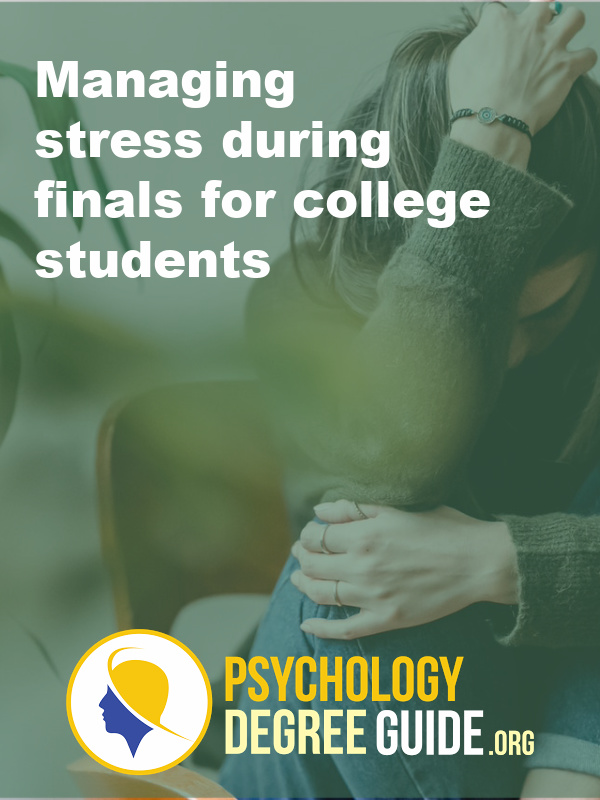Managing stress during finals for college students
- January 3, 2021
- Posted by: Administrator
- Category: Student Resources,

Stress is a natural reaction that our body generates in new situations or when there is a reason for concern; it is a state of alertness that can actually be positive in many cases.
When it comes to exams, however, stress can be detrimental to students and even interfere with their academic performance. College students must learn strategies for managing stress in order to focus and succeed.
What is stress?
Stress is defined as the physiological response to a stimulus that is perceived as threatening. This response of the body acts as a defense mechanism since it alerts us that we are facing a possible danger, giving us the heads up that we may have to prepare or respond to a hazardous situation. Stress is normally viewed as being negative, but it can be positive at lower levels since it serves as an alarm and motivates us to take action.
There are many different types of stress, including academic stress. Academic stress is defined as the physiological, behavioral, and emotional reaction to academic events. Students with academic stress may display excessive concern about their academic performance and may not be able to handle the demands of the educational environment, causing them to not turn in homework on time, have difficulty completing school activities, or feel fear when taking an exam. External situations such as the loss of a loved one or problems at home also influence this type of stress.
Symptoms of stress
A person with stress will manifest a series of symptoms not only on a physical level, but also on a psychological and behavioral level. These symptoms can often be confused with other mental or physical diseases due to the way they manifest.
The most common symptoms that a person presents with academic stress are:
- Physical symptoms: Recurrent headaches, difficulty sleeping (insomnia), tiredness, excessive sweating, digestive problems, back pain, strong palpitations, etc.
- Psychological symptoms: Anxiety, depression, concentration problems, mental blocks, memory problems, irritability, low motivation, restlessness, anguish, etc.
- Behavioral symptoms: Stop attending classes, little encouragement to carry out academic activities, isolation, carrying out other activities above study, etc.
Why do stress levels increase during finals?
Final exams are a common cause of academic stress. Students may even begin to generate a series of negative thoughts in the days following an exam, doubting their performance, and continuing to feed the stress, which can become anxiety and possibly lead to depression.
When there is a high level of stress before an exam, students are more likely to fail since constant worry makes it difficult to concentrate and to be able to answer the questions correctly. After the exam, feelings of sadness and discomfort may appear, which, if not addressed early, can be prolonged and interfere with the entire academic progress of the student.
During final exams, the pressure increases even more. In many cases, final exams are heavily weighted and can greatly influence the final grade for the course. Negative thoughts about the exam can lead students to have greater stress, where they feel pressured, they believe they will not be able to take it, and in the end, they fear a result they will not be proud of.
Low doses of stress are healthy, but when situations, such as final exams, are not handled correctly, students can be affected negatively, which makes it necessary to prepare with strategies to manage stress.
Strategies for colleges students to manage stress during finals
In order to manage symptoms of stress before, during, and after finals, students must know how to identify and manage the symptoms of stress. Some strategies that college students can implement to manage stress due to final exams are:
- Create study habits: Having a haphazard schedule can induce stress. Organization is helpful in all areas of life, and education is no exception. Organizing your study is a way to reduce stress.
- Dedicate time to do other activities: Although many times long hours of study are needed, breaks are recommended as they are good for your health. Taking short breaks during study hours helps clear your mind and relax. Drinking water, going out for air, disconnecting a bit after a long day of study helps maintain balance.
- Find a study partner: Academic stress can also arise if you are feeling isolated or struggling to master a subject on your own. Studying with another person is a way to prepare for tests and to encourage yourself.
- Seek professional help: As a college student going through a stressful situation due to exams, you feel that you have put into practice various strategies to manage stress. If you still cannot reduce it; professional help is your best ally. A psychologist is a person who will help you identify the thoughts behind your negative response to the tests and will give you guidelines to handle it.

